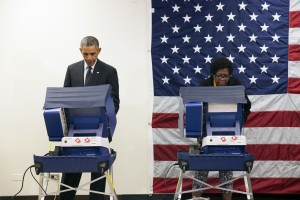
Voters across the country will cast their ballots on Nov. 4 to decide which party will control Congress for the next two years. With midterm elections coming up, it doesn’t take a pollster to guess which party will receive a majority of Utah’s votes.
Despite strong encouragement from the Church to participate in the election process, Utah continues to lag behind most of the nation in voter turnout, due in large part to the skewed nature of Utah politics. With a large majority of residents claiming the Republican party, some residents, both Republicans and Democrats, are left feeling their vote does not count.
BYU Political Science professor Richard Davis, disagrees with those who excuse themselves from voting for that reason.
“If everyone took that approach, then no one would vote, and there would be no democracy,” Davis said. “To retain our right to choose, we have to actually choose.”
Jay Goodliffe, another BYU political science professor, believes students have much more voting power than they may think.
“BYU students as a whole can make their voice heard,” Goodliffe explained. “If 30,000 students can work together to do something, then it is a big deal.”
Some students still feel that, despite professors and Church leaders’ encouragement, their vote will not make a difference.
“I’ve heard it a lot more when I was in school than anywhere else in Utah,” said Raphael Magre, a former BYU student from Vermont. “For me it is a little frustrating because in Utah everyone tends to vote the same way.
Magre also explained that in Vermont everyone had different views on topics and people were more open to political discussions.
While this may be the view of some students, Utah was recently the location of one of the most closely contested races in the nation.
In 2012 Republican candidate Mia Love lost to Democrat incumbent Jim Matheson by fewer than 800 votes in Utah’s 4th Congressional District. With nearly 250,000 votes cast, the race was one of the closest races in the nation.
Despite all the attention they receive, national races are not the only ones that will have an impact. Many local and state elections may have a greater effect on students’ lives.
Adam Brown, A BYU political science professor, told The Universe earlier this year that most Utah residents take for granted the amount of work that happens in the Utah legislature.
“Most of our country’s real governing does not happen in Washington, D.C.,” Brown said. “Utah’s legislature alone passes twice as many laws per year as Congress.”
One important aspect of American politics is the power given to state and local governments. Many of the Founding Fathers felt that local governments should have the greatest effect on people’s lives.
“There are other races besides the partisan ones,” Davis said. “The lower the race, the smaller the vote and the more impact one vote has.”
The LDS Church has released multiple statements encouraging members to vote.
“In this election year, we urge you to register to vote, to study the issues and candidates carefully and prayerfully, and then vote for and actively support those you believe will most nearly carry out your ideas of good government,” one statement reads.
For information on how to register to vote for residents or out-of-state citizens, see our article here.




